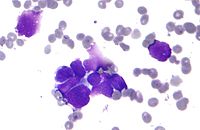
Prophylactic treatment of dacomitinib-induced skin toxicities in epidermal growth factor receptor-mutated non-small-cell lung cancer: A multicenter, Phase II trial.
Sign Up to like & getrecommendations! Published in 2023 at "Cancer medicine"
DOI: 10.1002/cam4.6184
Abstract: BACKGROUND Dacomitinib significantly improves progression-free survival and overall survival (OS) compared with gefitinib in patients with non-small-cell lung cancer (NSCLC) harboring epidermal growth factor receptor (EGFR)-activating mutations. However, dacomitinib often causes skin toxicities, resulting in… read more here.
Keywords: non small; skin toxicities; small cell; treatment ... See more keywords

CANTO‐RT: Skin toxicities evaluation of a multicentre large prospective cohort of irradiated patients for early‐stage breast cancer
Sign Up to like & getrecommendations! Published in 2022 at "International Journal of Cancer"
DOI: 10.1002/ijc.34057
Abstract: Skin damage is the most common and most important toxicity during and after radiation therapy (RT). Its assessment and understanding of the factors influencing its occurrence, is a major issue in the management of patients… read more here.
Keywords: skin; skin toxicities; breast cancer; cancer canto ... See more keywords

Preventive effect of Diallyl Trisulfide on cutaneous toxicities induced by EGFR inhibitor
Sign Up to like & getrecommendations! Published in 2019 at "International Immunopharmacology"
DOI: 10.1016/j.intimp.2019.01.023
Abstract: &NA; Cutaneous toxicities are the commonest side effects in patients with cancer treated using epidermal growth factor receptor inhibitors such as erlotinib. For patients with such toxicities, there is a lack of safe, effective pharmacological… read more here.
Keywords: diallyl trisulfide; group; skin; effect diallyl ... See more keywords

Taiwanese Dermatological Association consensus for the prevention and management of epidermal growth factor receptor tyrosine kinase inhibitor-related skin toxicities.
Sign Up to like & getrecommendations! Published in 2017 at "Journal of the Formosan Medical Association = Taiwan yi zhi"
DOI: 10.1016/j.jfma.2017.03.001
Abstract: BACKGROUND/PURPOSE This report describes the 2016 consensus of the Taiwanese Dermatological Association (TDA) regarding the definition, classification, diagnosis, prevention, and management of skin toxicities resulting from treatment with epidermal growth factor receptor (EGFR) tyrosine kinase… read more here.
Keywords: taiwanese dermatological; consensus; association; skin toxicities ... See more keywords

PEGylated Liposomes Accumulate in the Areas Relevant to Skin Toxicities via Passive Extravasation across "Leaky" Endothelium.
Sign Up to like & getrecommendations! Published in 2022 at "ACS nano"
DOI: 10.1021/acsnano.2c00423
Abstract: PEGylated liposome is the cornerstone platform for modern drug delivery. Unfortunately, as exemplified by PEGylated liposomal doxorubicin (aka Doxil), altered doxorubicin pharmacokinetics causes off-target accumulation in the skin, including the palms and feet, leading to… read more here.
Keywords: microscopy; skin toxicities; areas relevant; extravasation ... See more keywords

Follicular T helper cells and cutaneous T‐cell lymphomas
Sign Up to like & getrecommendations! Published in 2022 at "British Journal of Dermatology"
DOI: 10.1111/bjd.21839
Abstract: centre retrospective international cohort study designed to investigate clinical associations of skin toxicities induced by different ICI therapies. The study revealed that ICI-induced cutaneous toxicities may depend on certain factors, such as the specific agent… read more here.
Keywords: cell; follicular helper; cutaneous toxicities; skin toxicities ... See more keywords

Ibrutinib skin toxicities: report of two cases.
Sign Up to like & getrecommendations! Published in 2021 at "Journal of cutaneous pathology"
DOI: 10.1111/cup.14160
Abstract: Ibrutinib is a Bruton tyrosine kinase inhibitor used to treat many hematologic conditions, most commonly B-cell lymphomas and leukemias. Reportedly, skin rash is an adverse event in up to 27% of treated patients. Histopathologic description… read more here.
Keywords: toxicities report; report two; cases ibrutinib; ibrutinib skin ... See more keywords

Abstract 3052: Patient- and clinician-reported outcomes of radiotherapy-related acute skin toxicities in a tri-racial/ethnic breast cancer population
Sign Up to like & getrecommendations! Published in 2023 at "Cancer Research"
DOI: 10.1158/1538-7445.am2023-3052
Abstract: Background: Adjuvant radiotherapy (RT) following surgery significantly improves breast cancer survival. However, some patients, particularly minorities, develop acute skin toxicities that negatively impact their quality of life (QOL). The traditionally used measure of skin toxicities… read more here.
Keywords: breast cancer; racial ethnic; cancer; skin toxicities ... See more keywords

Unexpected severe hepatic and skin toxicities during high dose methotrexate course for osteosarcoma
Sign Up to like & getrecommendations! Published in 2022 at "Journal of Oncology Pharmacy Practice"
DOI: 10.1177/10781552221076456
Abstract: Introduction high dose methotrexate (HD-MTX) regimen is used in osteosarcoma, leukemia and lymphoma treatment. Osteosarcoma is mostly diagnosed in children and adolescents. Most frequent methotrexate toxicities are mucositis, myelosuppression, renal failure, hepatitis and necrotizing encephalopathy.… read more here.
Keywords: dose methotrexate; hepatic skin; skin toxicities; unexpected severe ... See more keywords

Mechanism of Lethal Skin Toxicities Induced by Epidermal Growth Factor Receptor Inhibitors and Related Treatment Strategies
Sign Up to like & getrecommendations! Published in 2022 at "Frontiers in Oncology"
DOI: 10.3389/fonc.2022.804212
Abstract: Epidermal growth factor receptor (EGFR) inhibitors are widely used to treat various types of cancers such as non-small cell lung cancer, head and neck cancer, breast cancer, pancreatic cancer. Adverse reactions such as skin toxicity,… read more here.
Keywords: cancer; egfr inhibitors; toxicity; treatment ... See more keywords